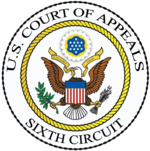| ACLU v. NSA | |
|---|---|
 | |
| Court | United States Court of Appeals for the Sixth Circuit |
| Full case name | American Civil Liberties Union v. National Security Agency |
| Argued | January 31, 2007 |
| Decided | July 6, 2007 |
| Citation(s) | 493 F.3d 644 |
| Case history | |
| Prior history | Summary judgment for the plaintiffs, 06-CV-10204 (E.D. Mich.) |
| Subsequent history | Appeal turned down by U.S. Supreme Court without comment on February 19, 2008. |
| Holding | |
| The ACLU did not have standing to bring the suit against the NSA, because plaintiffs could not present evidence that they were the targets of the "Terrorist Surveillance Program". | |
| Court membership | |
| Judge(s) sitting | Alice M. Batchelder, Ronald Lee Gilman, and Julia Smith Gibbons |
| Case opinions | |
| Majority | Batchelder |
| Concurrence | Gibbons |
| Dissent | Gilman |
 National Security Agency surveillance |
|---|
 |
American Civil Liberties Union v. National Security Agency, 493 F.3d 644 (6th Cir. 2007), is a case decided July 6, 2007, in which the United States Court of Appeals for the Sixth Circuit held that the plaintiffs in the case did not have standing to bring the suit against the National Security Agency (NSA), because they could not present evidence that they were the targets of the so-called "Terrorist Surveillance Program" (TSP).
On January 17, 2006, the American Civil Liberties Union (ACLU) on its own behalf, and on the behalf of three other organizations and five individuals, sued the National Security Agency (NSA) in the United States District Court for the Eastern District of Michigan, seeking declaratory judgment and injunctive relief arguing the TSP was unconstitutional and a violation of federal law. The government argued that the lawsuit should be dismissed or alternatively be granted summary judgment based on the State Secrets Privilege and the plaintiffs' lack of standing.
On August 17, 2006, District Court Judge Anna Diggs Taylor granted summary judgment for the plaintiffs, ruling that the TSP specifically involving "international telephone and internet communications of numerous persons and organizations" within the United States of America, was unconstitutional and illegal, and ordered that it be halted immediately.[1] She stayed her order pending appeal. She did not rule on the alleged NSA database of domestic call detail records, citing the State Secrets Privilege.
On January 31, 2007, the Sixth Circuit Court of Appeals reversed the district court ruling on the grounds that the plaintiffs could not show that they had been or would be subjected to surveillance personally, and therefore they lacked standing before the Court. The Court emphasized, however, that FISA and Title III are the exclusive means by which electronic surveillance is permitted and that no other authorization can comply with the law.
On February 19, 2008, the United States Supreme Court, without comment, turned down an appeal from the ACLU to let it pursue a lawsuit against the program that began shortly after the September 11th terrorist attacks.[2]
- ^ ACLU v. NSA, 438 F. Supp. 2d 754 (E.D. Mich. 2006).
- ^ "Court rejects domestic spying appeal". usatoday.com. Associated Press. February 19, 2008.
© MMXXIII Rich X Search. We shall prevail. All rights reserved. Rich X Search
